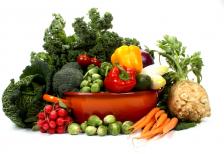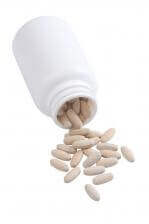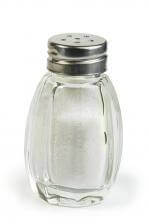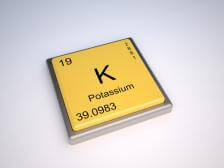How (Not) to Increase Your Potassium Intake
Most of us aren’t getting enough potassium. But it is also possible to get too much. Find out the risks of potassium supplements and salt substitutes
Monica Reinagel, MS, LD/N, CNS
Listen
How (Not) to Increase Your Potassium Intake
I’m sorry to be the bearer of bad tidings but almost nobody in the U.S. is getting enough potassium.
The Institute of Medicine would like us all to be getting about 4,700 mg of potassium a day. The average intake is only 2,640 mg, or slightly more than half the recommended amount. Even the folks at the very top of the chart – the 90th percentile of intake–are only averaging 3,760 mg, or about 80% of the recommended amount. Folks, this simply will not do. .
 Why Is Potassium Important?
Why Is Potassium Important?
Potassium plays an important role in regulating high blood pressure – a potentially lethal condition that affects a quarter of American adults and two-thirds of those over the age of 60. Potassium does a few other useful things as well, such as preventing bone loss, reducing the risk of kidney stones, and keeping your heart beating.
Studies have also found that a high potassium intake can largely offset the effects of high sodium intake. Seeing as we don’t seem to be willing or able to keep our sodium intake as low as the salt police would like, perhaps we should focus instead on increasing potassium?
Where Do We Get Potassium?
Dairy products, beans and legumes, meat, fish, and poultry all contain a fair amount of potassium. But by far the best food sources of potassium are fresh fruits and vegetables.

If I could wave my magic wand and get everyone eating 5 servings of vegetables and 2-4 servings of fruit every day, that alone would probably knock the potassium problem out of the park. But I know I’m preaching to the choir here. (And, by the way, I also see those of you lurking in the back of the choir and not eating your vegetables!)
Should You Take Potassium Supplements?
It might seem that taking potassium supplements would be a cheap and easy answer to the problem. But I’m not crazy about this solution – for 3 reasons…..

Reason #2: Supplements don’t impact diet choices. Some of the benefit of eating more broccoli comes from the vitamins in broccoli. The other benefit of eating more broccoli comes from the fact that we end up eating fewer French fries! When we get our nutrients from whole foods rather than supplements, there isn’t as much room on the plate for highly processed, nutrient-poor foods.
Reason #3. It’s too easy to overdo it with supplements. Although it would be pretty difficult to get too much potassium from whole foods, it’s a lot easier to get into trouble with supplements – especially if you have reduced kidney function or are taking certain medications that impair your ability to clear potassium from your blood. If your blood potassium levels get too high, it can cause weakness, arrhythmias, or even cardiac arrest.
Unless your doctor has prescribed potassium supplements to correct a deficiency, I would not recommend taking a potassium supplement, beyond the amount that might be found in a regular multi-vitamin.
What About Potassium-Based Salt-Substitutes?
Nutrition Diva listener Alice wondered whether using a potassium chloride salt substitute would be a good way to increase your potassium intake and cut down on sodium at the same time.

There’s another more serious risk as well. People with high blood pressure often use potassium chloride in order to cut down on their sodium intake. But certain high blood pressure medications (specifically, the potassium-sparing diurectics) are among those that can lower your potassium tolerance. If you are on any medication, check with your doctor to be sure that it’s safe for you to use a potassium-based salt substitute – and how much it is safe for you to use.
For everyone else, a potassium-chloride salt substitute (in reasonable amounts) is an OK way to increase your potassium – as long as you promise to sprinkle it on your vegetables!
References
Hoy MK, Goldman JD. Potassium Intake of the U.S. Population: What We Eat In America, NHANES 2009-2010. Food Surveys Research Group Dietary Data Brief No. 10. September 2012. Available at: https://ars.usda.gov/Services/docs.htm?docid=19476
Doorenbos CJ, Vermeij CG. Danger of salt substitutes that contain potassium in patients with renal failure. BMJ. 2003 Jan 4;326(7379):35-6. Link to article.

 Why Is Potassium Important?
Why Is Potassium Important?